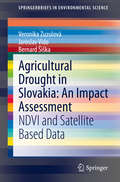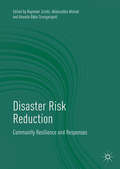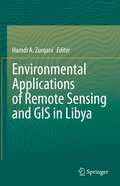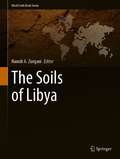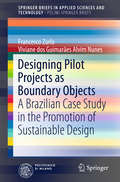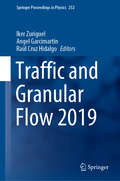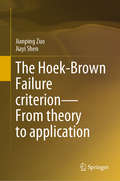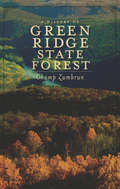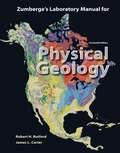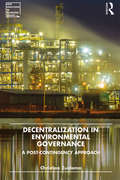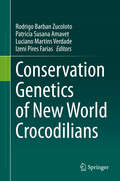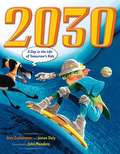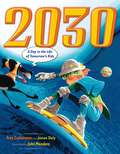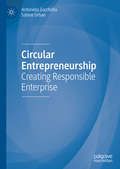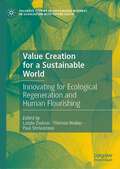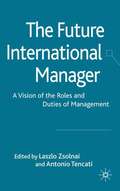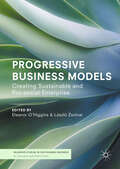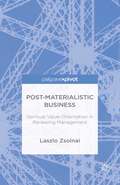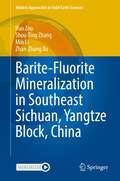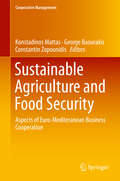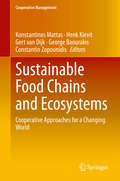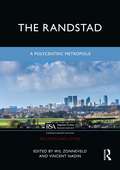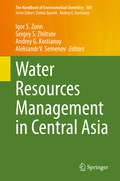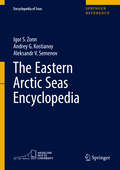- Table View
- List View
Agricultural Drought in Slovakia: NDVI and Satellite Based Data (SpringerBriefs in Environmental Science)
by Veronika Zuzulová Jaroslav Vido Bernard ŠiškaThis book gives an insight into the evaluation of drought in Slovakia and provides an assessment of Normalized Difference Vegetation Index (NDVI) as a method suitable for an evaluation of drought in agricultural land. Dry seasons in the time series from 1960 to 2014 were determined according to the monthly Palmer Drought Severity Index (PDSI). The field research was carried out on 12 sites including western Slovakia, Prešov, Trnava and Nitra regions. Data collected from satellite imagery, climate data analyses and drought indices was analysed to determine the value of NDVI as an evaluation tool.
Disaster Risk Reduction: Community Resilience and Responses
by Bupinder Zutshi Akbaruddin Ahmad Ananda Babu SrungarapatiThis book discusses the interconnected, complex and emerging risks in today’s societies and deliberates on the various aspects of disaster risk reduction strategies especially through community resilience and responses. It consists of selected papers presented at the World Congress on Disaster Management, which focused on community resilience and responses towards disaster risk reduction based on South Asian experiences, and closely examines the coordinated research activities involving all stakeholders, especially the communities at risk. Further, it narrates the experiences of disaster risk-reduction in different communities that have policy implications for mitigation of future disaster risks in the societies affected by these types of disasters. Written from the social science perspective to disasters rather than an engineering approach, the book helps development and governance institutions to prioritize disasters as a problem of development rather than being parallel to it.
Environmental Applications of Remote Sensing and GIS in Libya
by Hamdi A. ZurqaniThis book addresses the environmental challenges that Libya and similar countries in the regions are currently facing. Each chapter of this book provides a methodology using remote sensing (RS) and geographical information systems (GIS) dealing with one of these environmental challenges such as monitoring and mapping soil salinity and prediction of soil properties, monitoring and mapping of land degradation, spatiotemporal land use/cover, agricultural drought monitoring, hydrological applications such as spatial rainfall distribution, surface runoff, geo-morphometric analysis, flood hazard assessment and mapping, hydrologic and hydraulic modeling, pollution hazard assessment, and climate-related geophysical processes. This book also assesses the impacts of climate change on natural resources using both RS and GIS, as well as other applications, covering different parts of Libya. This book is beneficial for graduate students, researchers, policy planners, and stakeholders in Libya as well as other countries that share similar environmental issues. Also, the methodologies followed in the book's chapters can be applied to any other regions around the world with similar landscapes and climatic conditions.
The Soils of Libya (World Soils Book Series)
by Hamdi A. ZurqaniThis book presents the soil pedodiversity in Libya. Soils are the source of all life; there can be no life without them. Further, each soil has its own history and its present conditions, which have been shaped by many different factors (e.g. climate, biota, parent material, and relief or topography). The book, divided into eight chapters, provides extensive information on Libyan soils. Chapter one provides an introduction and a broad perspective of the subject, while Chapter two covers the history of soil mapping and research in Libya. Chapter three focuses on local factors of soil formation and describes the geology and climate of the region to explain the diversity of its soils. Chapter four discusses soil classification systems and those most commonly used in the country. The fifth chapter illustrates the constraints and limiting factors that negatively affect agricultural activities across the country. The land cover/land use and the vegetation of the country are described in Chapter six. In turn, Chapter seven presents the status quo of soil biology, the corresponding related research activities, and the other biological properties of Libyan soils. The final chapter (Chapter eight) focus on land degradation and desertification in Libya, emphasizing the main causes, impacts of the phenomena, and efforts to combat it. This book demonstrates the problems that the country is currently facing as a result of climate change, soil erosion, salinization, and pollution, and outlines potential remedies to improve local food security. Bringing together the perspectives and expertise of many distinguished scientists from various universities and institutions in and outside of Libya, the book represents a unique and highly valuable resource.
Designing Pilot Projects as Boundary Objects
by Francesco Zurlo Viviane dos Guimarães Alvim NunesThis book describes a collaborative Design Pilot Project held in Brazil (called MODU. Lares) involving micro and small enterprises and other actors in the furniture sector. The experience was based on an action research method and evaluated by using a tool, in order to assess the value of pilot project as a boundary object capable of fostering innovation and sustainability. The impact of the Design Pilot Project in triggering change in a fragmented local system with a poor environmental and social record, as well as management and innovation issues, were assessed with the help of the same tool, taking into account environmental, technological, economic, sociocultural, and organizational indicators. The collaborative network established was chiefly based on four elements: prototypes, meetings, exhibitions and the Pilot Project (as an overall process). The results indeed demonstrate that a Design Pilot Project can be a valid instrument for establishing a collaborative environment that promotes sustainability and innovation, particularly in contexts with a weak associative culture. Such collaborative projects can constitute the first step in a design policy cycle in developing countries, contributing to the definition of ideas and objectives among local stakeholders, minimizing the risks of failure, and increasing the chances of receiving governmental support.
Traffic and Granular Flow 2019 (Springer Proceedings in Physics #252)
by Iker Zuriguel Angel Garcimartín Raúl Cruz HidalgoThis book gathers contributions on a variety of flowing collective systems. While primarily focusing on pedestrian dynamics, they also reflect the latest developments in areas such as vehicular traffic and granular flows and address related emerging topics such as self-propelled particles, data transport, swarm behavior, intercellular transport, and collective dynamics of biological systems. Combining fundamental research and practical applications in the various fields discussed, the book offers a valuable asset for researchers and practitioners alike.
The Hoek-Brown Failure criterion—From theory to application
by Jianping Zuo Jiayi ShenThis book provides a comprehensive coverage of the theory and principle of the Hoek-Brown (HB) failure criterion, methods or guidelines for estimating the HB input parameters, and the methodology of application of the HB criterion in rock engineering projects. It aims to help researchers, engineers and research students who work in the area of rock mechanics and mining engineering. Academics can quickly obtain an overview of the state of the art of the theory and principle of the Hoek-Brown criterion by reading the book before they advance their researches on the topics related to rock failure criteria. Geotechnical engineers can select appropriate Hoek-Brown input parameters for the design and analysis of rock engineering projects with the help of the principles introduced in this book. Research students may use the book as a textbook to learn the principle of rock mechanics related to rock mass properties.
A History of Green Ridge State Forest
by Champ ZumbrunGreen Ridge State Forest is a haven of calm and natural beauty among the Appalachians of western Maryland. This land was once the frontier of the nation, and trailblazers such as Thomas Cresap and George Washington were among the first Europeans to discover its wonders: the swift Potomac, the flowering dogwood and pine in the mountain reaches and the nighttime calls of the bobcat and the barred owl. The vision and stewardship of people like forester Fred W. Besley preserved the forest for future generations of hikers, explorers and families. Join former forest manager Champ Zumbrun as he traverses hidden trails to tell the remarkable story of Green Ridge State Forest.
ZUMBERGE'S LABORATORY MANUAL FOR Physical Geology
by James Zumberge Robert H. Rutford James L. CarterLaboratory Manual for Physical Geology, 14e is written for the freshman-level laboratory course in physical geology. In this lab, students study Earth materials, geologic interpretation of topographic maps, aerial photographs and Earth satellite imagery, structural geology and plate tectonics and related phenomena. With over 30 exercises, professors have great flexibility when developing the syllabus for their physical geology lab course.
Decentralization in Environmental Governance: A post-contingency approach (New Directions in Planning Theory)
by Christian ZuidemaDecentralization in Environmental Governance is a critical reflection on the dangers and risks of governance renewal; warning against one-sided criticism on traditional command and control approaches to planning. The book formulates the arguments that support when and how governance renewable might be pursued, but this attempt is not just meant for practitioners and scholars interested in governance renewal. It is also useful for those interested in the challenge of navigating a plural landscape of diverse planning approaches, which are each rooted in contrasting theoretical and philosophical positions. The book develops a strategy for making argued choices between alternative planning approaches, despite their theoretical and philosophical positions. It does so by revitalizing the idea that we can contingently relate alternative planning approaches to the circumstances encountered. It is an idea traced to contingency studies of the mid and late 20th century, reinterpreted here within a planning landscape dominated by notions of uncertainty, complexity and socially constructed knowledge. This approach, called ‘Post-contingency’, is both a theoretical investigation of arguments for navigating the theoretical plurality we face and an empirical study into renewing environmental governance. Next to its theoretical ambitions, Decentralization in Environmental Governance is practical in offering a constructive critique on current processes of governance renewal in European environmental governance.
Conservation Genetics of New World Crocodilians
by Rodrigo Barban Zucoloto Patricia Susana Amavet Luciano Martins Verdade Izeni Pires FariasThis book aims to be a comprehensive review of the literature on the conservation genetics of the New World crocodilians, from the biological and demographical aspects of the living species to the application of molecular techniques for conservation purposes. It covers the current status of the molecular genetics applied to phylogenetics, phylogeography, diversity, kinship and mating system, and hybridization, as well its implications for decision making with regards to the conservation of these species at academic and governmental levels. This book can be used as a guide for graduate and undergraduate students to understand how conservation genetics techniques are carried out and how they can help preserve not only crocodilians but also other living species.
2030: A Day In The Life Of Tomorrow's Kids
by Amy Zuckerman James DalyGlobal events and new technology change how we live from moment to moment. So, what will our world be like in twenty years? Come take a look as futurists Amy Zuckerman and James Daly examine what a kid?s daily life might be like in the year 2030. Inspired and informed by trends and scientifi c and technological research, 2030 is not only a peek at some cool future gadgets (talking dog collars, cars that drive themselves), but also a thoughtful examination of how our lives might be impacted as we adjust to environmental change.
2030: A Day in the Life of Tomorrow's Kids
by Amy Zuckerman James DalyWinner of the 2012 Grand Canyon Reader Award for a Non-fiction bookGlobal events and new technology change how we live from moment to moment. So, what will our world be like in twenty years? Come take a look as futurists Amy Zuckerman and James Daly examine what a kid?s daily life might be like in the year 2030. Inspired and informed by trends and scientifi c and technological research, 2030 is not only a peek at some cool future gadgets (talking dog collars, cars that drive themselves), but also a thoughtful examination of how our lives might be impacted as we adjust to environmental change.
Circular Entrepreneurship: Creating Responsible Enterprise
by Antonella Zucchella Sabine UrbanThis original book explores how the principles of circularity, considered a law of nature but neglected within the materialistic orientation of the industrial age, are becoming attractive again in business and society. Investigation reveals enterprises small and large delivering a stimulating message, from changes in entrepreneurial mindsets to the inclusive use of new technologies and a push for innovation. Zucchella and Urban explore the novel concept of circular enterprise, showing how, with their capacity to innovate, these firms are becoming the most powerful actors of a new, sustainable social order. They examine two fundamental questions: why is this revolution occurring now, and how is it being implemented? Focusing on the most innovative practices, they demonstrate the potential of circular enterprise for industry and wider society, making clear that a new world is emerging.
Electromagnetic Fields and Waves in Fractional Dimensional Space
by Muhammad Zubair Qaisar Abbas Naqvi Muhammad Junaid MughalThis book presents the concept of fractional dimensional space applied to the use of electromagnetic fields and waves. It provides demonstrates the advantages in studying the behavior of electromagnetic fields and waves in fractal media. The book presents novel fractional space generalization of the differential electromagnetic equations is provided as well as a new form of vector differential operators is formulated in fractional space. Using these modified vector differential operators, the classical Maxwell's electromagnetic equations are worked out. The Laplace's, Poisson's and Helmholtz's equations in fractional space are derived by using modified vector differential operators.
Value Creation for a Sustainable World: Innovating for Ecological Regeneration and Human Flourishing (Palgrave Studies in Sustainable Business In Association with Future Earth)
by Laszlo Zsolnai Thomas Walker Paul ShrivastavaThe ecological, social and technological challenges of the Anthropocene require developing and implementing new economic, business, and financial models to create sustainable value for a wide range of stakeholders including nature, society, and future generations. This book defines ‘sustainable value creation’ as bringing forth products, services, organizational forms, processes, actions, and policies which satisfy real social needs and contribute to the ecological regeneration of nature. The book collects and analyzes innovative economic, business, and social models of sustainable value creation globally. It critically examines the existing mainstream models of business and financial value creation. In reviewing both traditional and sustainability-oriented models, it focuses on both the challenges and opportunities inherent in a possible shift from models based on single-stakeholder wealth creation to models that propagate multidimensional value creation. Part of the Palgrave Studies in Sustainable Business in Association with Future Earth series, this book aims to engage academics, and business and civil society practitioners to discuss innovative value creation models for a sustainable world. Interdisciplinary and intercultural exchange will be facilitated to inspire and cross-fertilize different knowledge and action fields as well as to promote intergenerational dialogue about the prospects of the human-earth system.
The Future International Manager
by Laszlo Zsolnai Antonio TencatiAn in-depth look at the desired professional profile of new international managers in different aspects of business. It examines the qualities an international manager needs to possess, including commitment to environmental sustainability, sensitivity toward gender and diversity issues and an engagement in progressive entrepreneurship.
Progressive Business Models: Creating Sustainable and Pro-Social Enterprise (Palgrave Studies in Sustainable Business In Association with Future Earth)
by László Zsolnai Eleanor O'HigginsThis book presents and analyses exemplary cases of progressive business, understood as ecologically sustainable, future-respecting and pro-social enterprise. The authors present a number of companies following progressive business practices from a range of industries including ethical and sustainable banking, artisan coffee production and distribution, pharmaceutical products, clean technology, governance in retailing, responsible hospitality and consumer goods. With case studies from around Europe such as Tridos Bank in The Netherlands, Béres Co. in Hungary, Novo Nordisk in Denmark, Lumituuli in Finland, John Lewis in the UK and Illy Café from Italy, these progressive companies have global reach and an international impact. The collected cases aim to show the best to be expected from business in the 21st century in a structured accessible way, suitable for any readers interested in innovative ways of creating forward-looking sustainable business.
Post-Materialist Business: Spiritual Value-Orientation in Renewing Management
by László ZsolnaiPost-Materialist Business presents a spiritual-based approach to business and management. It uses pluralistic view of spirituality and provides a number of inspiring cases of alternative organizations which go beyond the materialistic mindset of business and serve the common good of society, nature, and future generations.
Barite-Fluorite Mineralization in Southeast Sichuan, Yangtze Block, China (Modern Approaches in Solid Earth Sciences #23)
by Hao Zou Shou-Ting Zhang Min Li Zhan-Zhang XuThis book describes the mineralization process of barite-fluorite deposits in southeastern Sichuan, Yangtze Block, China. Mainly through systematic field geological surveys and detailed indoor research work, the typical barite-fluorite deposits in this area were analyzed using a variety of analysis methods such as single fluid inclusion LA-ICP-MS composition analysis, trace rare earth element analysis, H-O-S-Sr isotope analysis, F element content analysis, and Sm-Nd geochronological analysis. By in-depth analysis of the ore-forming environment, mineralization process and geological characteristics of barite-fluorite deposits, the following were determined: (1) the source of ore-forming fluids of barite-fluorite deposits and (2) the migration, concentration, enrichment, and evolution of ore-forming sources, exploring the formation mechanism of barite-fluorite deposits. Summarizing the mineralization regularity of the deposit in this area of China provides a new insight and basis for the study of similar types of deposits in the world.
Sustainable Agriculture and Food Security: Aspects Of Euro-mediteranean Business Cooperation (Cooperative Management)
by Constantin Zopounidis George Baourakis Konstadinos MattasThis book brings together research on cooperative management from the agriculture and food sector. By examining issues from food-policy, trade and environmental perspectives and presenting both methodological and empirical work, it allows readers to develop a deeper understanding of collective management processes and cooperative initiatives, and provides a theoretical background for promoting research in the various sectors in which market communities operate. On a more global level the offers insights into how to building powerful tools for decision making, particularly at a time when agriculture and the economy alike are affected by a volatile political, social and economical environment and are forced to undergo major structural changes.
Sustainable Food Chains and Ecosystems: Cooperative Approaches for a Changing World (Cooperative Management)
by Constantin Zopounidis George Baourakis Gert Van Dijk Konstantinos Mattas Henk KievitUnarguably, preserving the ecosystem, securing sustainability and understanding the dynamics of agro-food chains have all become vital policy objectives with several interlinked dimensions. The main objectives of this book are to draw the attention of researchers, policymakers and businesspeople to the relation between agro-food chains and the ecosystem, and to demonstrate the importance of building resilient agro-food chains that take into account climate change and environmental challenges. Agro-food chains as they function today can serve as powerful tools for promoting sustainable forms of agriculture, consumption and production that are embedded in a viable ecosystem. The book addresses a range of environmental, methodological and societal issues from a transaction perspective, while also providing extensive background information on the topic, and outlining future applications and research directions.
The Randstad: A Polycentric Metropolis (Regions and Cities)
by Wil Zonneveld Vincent NadinThe Randstad metropolitan region encompassing Amsterdam, The Hague, Rotterdam and Utrecht in the western Netherlands is regarded worldwide as a model of a ‘successful’ polycentric metropolis. It is widely cited as an example of how a region of interconnected small cities can effectively compete globally by providing complementary functions which together match the power of large monocentric cities. The methods of strategic spatial planning, regional design and strategic projects that are said to underpin this polycentric metropolis are used as models for practitioners and students around the world. But is this high reputation deserved? Does the Randstad really function as a polycentric metropolis? The operation of the Randstad as a polycentric networked region is controversial both in terms of the actual strength of relations between its component parts, and the value of promoting polycentricity in policy. What are the costs and benefits of a Randstad metropolis? Does polycentricity improve the performance of the region in economic, social and environmental terms? How has the polycentric metropolis evolved and what part is played by its delta location? Has spatial planning made a difference in the form and operation of the region today? How will this spatial configuration fare in the face of the climate crisis and need to create healthy cities and regions? Is there benefit in pursuing the idea of a polycentric metropolis in government policy and action, and how? These questions are of critical interest within the Netherlands but experience in the Randstad offers valuable insights to many other complex urban regions around the world. This book will provide a critical analysis of the Randstad and lessons for strategic planning in other metropolitan regions.
Water Resources Management in Central Asia (The Handbook of Environmental Chemistry #105)
by Igor S. Zonn Sergey S. Zhiltsov Andrey G. Kostianoy Aleksandr V. SemenovThis book reviews the current status of water resources management in Central Asian countries, and outlines the history, policies and cross-border cooperation regarding water resources management in the region. Particular attention is paid to the evolution of water resources management in Central Asia, past and future water transfer projects, specific problems concerning water use and pollution, and national approaches to water management in Kazakhstan, Kyrgyzstan and Tajikistan, as well as to related conflicts between the Central Asian countries. Together with the companion volumes on Water Resources in Central Asia: International Context and Water Bodies and Climate Change in Central Asia, it offers a valuable source of information for a broad readership, from students and scientists interested in the environmental sciences, to policymakers and practitioners working in the fields of water resources policy and management, international relations, and environmental issues.
The Eastern Arctic Seas Encyclopedia
by Igor S. Zonn Andrey G. Kostianoy Aleksandr V. SemenovThis Encyclopedia is designed to accumulate and systematize our knowledge about the unique natural water areas - the Laptev, East Siberian and Chukchi seas, their wealth, the events that took place on its waters and shores, and the remarkable people whose lives were and are closely intertwined with the seas. The Encyclopedia contains about 1,500 terms and concepts related to the seas in alphabetical order. It describes geographical features: rivers, lakes, straits, bays; provides information about towns, seaports, transport communications, basic aquatic biological species, nature reserves, national and international programs for the study of the sea, research institutes, historical monuments, activities of prominent explorers and travelers, researchers and scientists. The Encyclopedia also includes a chronology of major historical events connected with the Eastern Arctic seas for more than 400 years.
